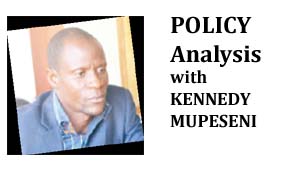THE usual columnist of Policy Analysis James Muyanwa is out for a month. However, the column will continue to run until he returns and in his absence, Kennedy Mupeseni is going to anchor the column with interesting topics bordered on policy matters.
THE instability in the global oil supply due to the war on Ukraine and the latest Gaza bombardment calls for local solutions to stabilise the fuel pump price.
One of the solutions is to embark on an aggressive fuel blending activities that use ethanol and biodiesel that will play a big role in making the country more resilient to externalities.
The debate around fuel blending has been with us for more than 50 years but it is only now that the Government is finalising the blending policy framework to kick-start the roll out of the blending.
As confirmed recently by Energy Minister Peter Kapala, the delay in having blended fuels sold in Zambia has been caused by a pricing mechanism for the blended fuels that was still being developed by The Energy Regulation Board (ERB).
Once that is done, it will result in the actual modelling of fuel blending and the roll-out of blended fuels in Zambia.
The other factor Mr Kapala named as a drawback is the lengthy process of studies to check and calculate the optimum blending ratios (optimum percentages of ethanol and petrol, for example) for Zambia considering the climate obtaining in the country and the kind of vehicles on the Zambian roads.
From his perspective, ERB has to develop and approve the technical specifications for blending fuels in Zambia.
“As a nation, we have to look at the direction of blended fuels for economic, social and environmental reasons, which include energy security, as ethanol blends increase the fuel pool of the country and reduce unleaded petrol imports into the country thus saving foreign exchange,” Mr Kapala explains.
During the opening the 2nd session of the 13th National Assembly, President Hakainde Hichilema put it clear that, Indeni Refinery Company Limited shall no longer be processing crude oil but shall be producing locally produced blended fuel, whereby ethanol will be mixed with finished products to create a ready market for blended fuel and reduce cost of imports for
plant – in the Katuba area of Chibombo District has already set its base to go into production of blended fuel.
And Luapula based, Sunbird Bioenergy Zambia, is scheduled to have its first-ever ethanol produced from cassava feedstock, blended with petrol.
Sunbird Bioenergy Energy Zambia Agriculture Director Mark Muchinga was sometime back quoted saying the company would have its first ethanol blend, done by Indeni Petroleum Refinery in Ndola.
ERB has also confirmed having developed and approved the technical specifications for blending fuels in Zambia.
ERB Public Relations Manager Namukolo Kasumpa, however, stated that the process of blending had not commenced due to some logistical aspects required to facilitate blending of fuels, besides the development of technical specifications.
Once rolled out, the blended fuel would be available to consumers and the general public just like any other petroleum products currently sold by entities licensed by the ERB.
ERB working with the Zambia Bureau of Standards (ZABS) and stakeholders constituted a Technical Working Committee which has representation from INDENI, TAZAMA, Oil Marketing Companies (OMCs), the Biofuels Association of Zambia (BAZ) and Original Equipment Suppliers and Manufacturers among others.
This has culminated in the development of Zambian Standards for blending diesel with bio-diesel and bio-ethanol with petrol.
Early in the year, Mr Kapala disclosed that the government would this year start constructing ethanol plants in provincial centres for blending fuel, as a measure and strategy to reduce the cost of petroleum in the country.
He reveals that the blended fuel will use ethanol from cassava, despite the Government’s original wish to use maize.
“Using maize, however, is now not an option because it could threaten the national food security,” Mr Kapala.
It is not a secret that apart from cassava farmers, other farmers and businesses can benefit from the blending of fuels with ethanol.
ERB board chairperson Reynold Bowa says the scope will be by first starting with a blending ratio of 20 per cent as the country looks to improve further.
Mr Bowa observes that the legal framework around fuel blending with ethanol of up to 20 per cent would be a game changer.
“This will bring a positive impact in terms of lowering the cost of fuel as the fuel will be blended in the local currency which would trigger stability in fuel prices,” he states.
Mr Bowa says blending at 20 per cent or below does not affect engines which would be critical in bringing stability in the energy sector .It is hoped that this time around the country will finally start blending fuel thereby joining other peers who are into fuel blending and managed to stabilise fuel prices.
Fuel blending has far reaching positive economic implications in that apart from facilitating stability in the local fuel market, it will provide the much needed market to farmers thereby encouraging production.
The country should not heed to advise that going into biofuel production will bring hunger as the concentration will be on growing energy crops because any measure that is capable of lifting people out of poverty should be embraced wholeheartedly.







